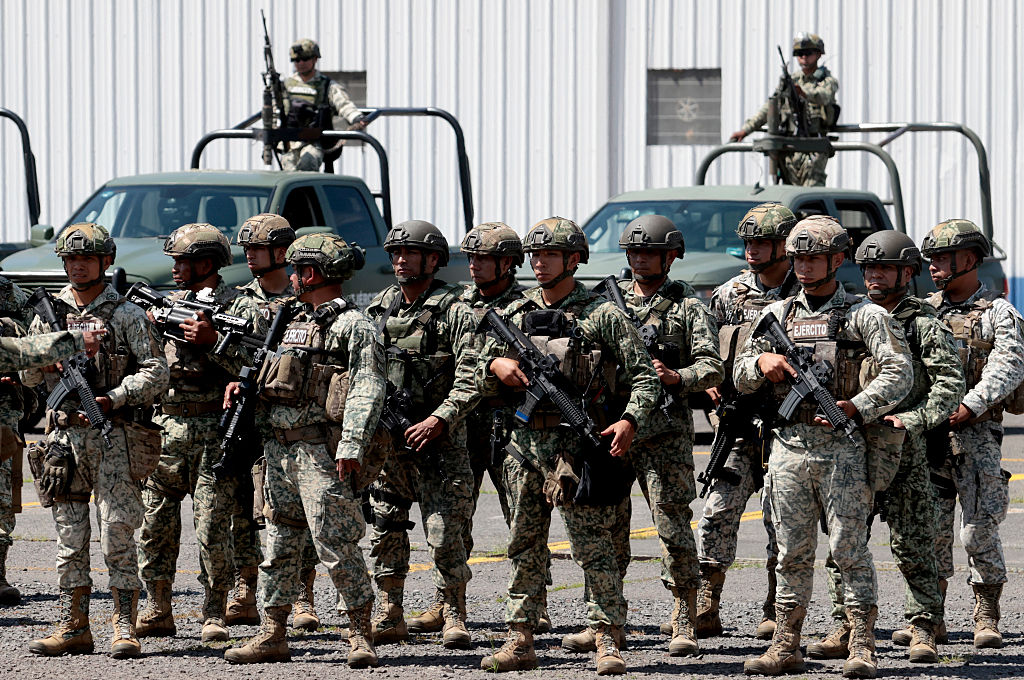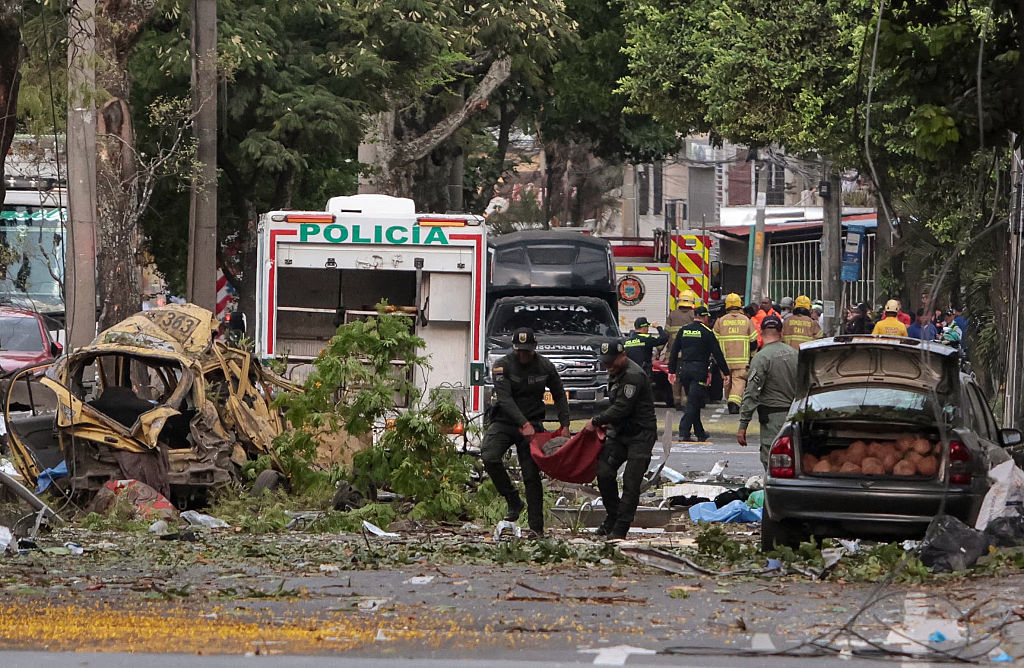Juárez, Mexico
On the morning of September 2, in Juárez, Chihuahua, Mexican law enforcement raided a remote safehouse and uncovered one of the most grotesque cartel operations they had ever encountered. They found not just the usual drugs but rudimentary medical equipment and bloodstained tarps. The evidence confirmed what many investigators had suspected but couldn’t prove: that growing US demand has created a black market in human babies. Police arrested a brutal female gangster, Martha Alicia Mendez Aguilar, who was allegedly running an operation that procured these babies, luring in young mothers and performing illegal C-sections. On the streets they call her La Diabla: the She-Devil.
Many of these women were lured with promises of easy cash jobs during the final months of pregnancy
For months, the US National Counterterrorism Center (NCTC) had tracked La Diabla’s movements. The dossier they compiled before the raid described a woman who was an expert at seeking out impoverished, pregnant girls and reeling them in with promises of work or money. For the girls in La Diabla’s grip, the promises proved empty. The babies were cut from the young mothers’ bodies and sold for as much as 250,000 pesos ($14,000) to American buyers in El Paso, Texas. It has been alleged that many of the girls did not survive the ordeal and their organs became another product to be sold.
This seems almost too macabre to be true, but an account I heard from the mother of one victim persuaded me that the worst can and does happen. I talked to her in a cramped car in Chihuahua state as she clutched a rosary. “My daughter was a good person, she never wronged anybody… she was so excited to have her baby, investigators asked me if my daughter wanted to sell her baby, but that wasn’t the case. She was already buying everything for her son, and telling her daughter how she was going to be a big sister.”
Her voice broke as she described searching police stations, hospitals, morgues – any place that might give her answers after her daughter went missing. It was only after La Diabla’s arrest that investigators confirmed that her daughter had been one of La Diabla’s alleged victims, lured with the promise of money for prenatal care. In the end she was butchered for profit.
It would be one thing if La Diabla were a horrific anomaly but such stories echo across Mexico’s northern states, where women vanish daily into the machinery of organized crime. For years, Juárez has been synonymous with femicide, the killings of women often dismissed as collateral damage in cartel wars. La Diabla’s alleged operation is only the latest twist in the awful story.
Many of the women who fell into her operation were offered promises of easy cash jobs during the final months of pregnancy, others with invitations to make new friends or meet a man interested in taking them on a date. One woman told me she narrowly escaped La Diabla’s network. She had been promised simple, legal work for quick pay in Juárez, nothing that seemed suspicious at first. “My friend had been working with people in Juárez and making money, so I guess she told them to contact me. Over messages the guy made it seem like a good deal and I wouldn’t have to stay long. They said they wanted to help me because I’m pregnant and they kept telling me how much money I would make with them.”
She described being contacted over Facebook by a persistent individual, urging her to meet. This Facebook profile was later identified as one of those linked to La Diabla. A relative became suspicious and advised her that the offer seemed odd and the young woman backed out of the meeting. Her testimony is now part of the prosecution’s case. Her survival offers a rare glimpse into the mechanics of the trade: recruitment, transport and coercion. How many others never made it out alive?
Investigations into this network, on both sides of the border, are only just beginning. A Mexican law-enforcement source who worked on the investigation spoke to me on the condition of anonymity. He told me: “There is a lot of talk that these babies were sold into illegal adoption but when we checked the phone contacts of the woman [La Diabla], the men transferring the money and crossing the babies were smugglers. We don’t know where the babies eventually ended up.”
These smugglers are experts in moving everything and anything across the border. One man was recently found to have a six-week-old Bengal tiger cub from Tijuana in his car. Dried hummingbirds – a necessary ingredient for a folk-magic love potion – have been seized. Smuggling babies is more complex. Sham paperwork is often procured, including Mexican birth certificates, while the babies are sometimes drugged to ensure they don’t start crying, bringing attention to the smugglers.
Why would the Cártel de Jalisco Nueva Generación (CJNG), one of the world’s wealthiest cartels, move into baby-trafficking? The short answer is that there’s money in it, and because impunity allows experimentation. Trafficking older children has long been a shadow industry in Latin America and the US, for illegal adoptions, child labor, sex-trafficking. But the industrial-scale operation uncovered in Juárez points to something new: a cartel cutting babies straight out of mothers and then selling them to the highest bidder.
Since January, the southern border crackdown has hit cartel profits harder than most US policymakers probably realize. Stricter enforcement and expanded surveillance have disrupted some of CJNG’s most lucrative human-smuggling routes and slowed the flow of fentanyl shipments north.
To compensate, cartels have pivoted, inventing new economies of violence. Baby-trafficking, organ-harvesting, crypto-laundering – each is a response to lost revenue. Every shift in US policy changes the underworld of organized crime. Crackdowns don’t end the business, they mutate it.
Cartels adapt faster than the governments trying to contain them, turning political victories in Washington into new criminal blueprints in Sinaloa, Jalisco, and now Juárez. The arrest of La Diabla was made possible by unprecedented coordination between US and Mexican agencies.
NCTC Director Joe Kent later called it a “terrorist cartel” operation, a phrase once controversial, now codified by President Trump’s designation of CJNG and other cartels as Foreign Terrorist Organizations. This meant that US counterterrorism infrastructure could be redirected against them. Intelligence once focused on al-Qaeda and ISIS now targets cartels such as CJNG that control swaths of Mexican territory with military precision.
After the border crackdown, cartels have pivoted – inventing new economies of violence
US officials insist this is the only way to treat them: as terrorists. And yet, for families in Juárez, Chihuahua, Guadalajara, and beyond, the designation doesn’t matter. What matters is that women are dying, babies are vanishing, and every cartel bust feels like just another head cut from a hydra.
“This is one example of what terrorist cartels will do to diversify their revenue streams and finance operations,” Kent said. Yet what I saw in Juárez was beyond policy language. It was the commodification of life at its most obscene. For American couples desperate for a baby, willing to look the other way about how it came into their arms, $14,000 is a fraction of the cost of legal adoption. For child-traffickers, it’s even better, and for CJNG, it’s a goldmine. But for the women left behind, it’s a death sentence.
As La Diabla sits in a Juárez prison awaiting trial, the questions are piling up. How many babies were sold? How many women were allegedly killed? Who on the US side is being held accountable for buying into this supply chain? Mexican authorities say they have identified several women connected to the network, though they will not disclose their identities.
US officials insist investigations into American buyers are ongoing. But in borderland cities like Juárez, the fear remains. Everyone wonders if another La Diabla is already taking her place.
For the families I spoke to, there’s no comfort in intelligence victories or policy designations. There is only the gnawing absence of their daughters and granddaughters and the knowledge that somewhere, their stolen babies might still be alive, raised in American suburbs with no memory of the women who carried them.
Before I left Chihuahua, the mother I interviewed cried with me for her daughter and the granddaughter she leaves behind. “I want justice, I want this woman to pay for what she did to my daughter. She was smirking in the courtroom, and I need her to pay.”
This article was originally published in The Spectator’s October 27, 2025 World edition.


























Leave a Reply